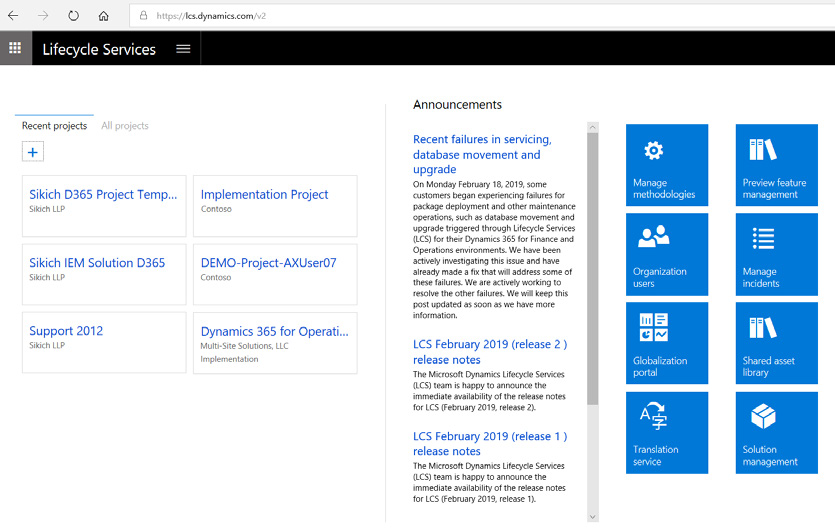This website uses cookies so that we can provide you with the best user experience possible. Cookie information is stored in your browser and performs functions such as recognising you when you return to our website and helping our team to understand which sections of the website you find most interesting and useful.

Cut Your ERP Implementation Time in Half with Supply Chain Pre-Configuration
When companies decide to deploy a modern, cloud ERP or CRM solution like Microsoft Dynamics 365, they want to reap the transformational benefits of the technology as soon as possible. At the same time, they hope to avoid the disruption, budget and schedule overruns, risk, and uncertainty of poorly planned deployment projects.
To streamline Dynamics 365 deployments and ensure the right outcomes, Sikich has developed the HEADSTART SM approach. We use HEADSTART in nearly every project to our clients’ benefit, and continue refining the methodology as Dynamics 365 evolves along with organizations and industries. No matter if you’re a business leader looking to modernize your technology or a Professional Advisor helping clients find the best partner’ advising companies, HEADSTART could give you a critical edge.
Streamline Microsoft Dynamics 365 Implementations
To streamline Microsoft Dynamics 365 for Finance and Supply Chain and Dynamics 365 CRM deployments, Sikich has developed the HEADSTART
approach. Our HEADSTART methodology has proven practices for equipment manufacturers, already pre-configured right out of the box.
HEADSTART FOR EQUIPMENT MANUFACTURERS
HOW PRECONFIGURATION ACCELERATES YOUR SYSTEM DEPLOYMENT
Business applications like ERP are designed to support transactional workflows. The more workflows a system is able to support, the more configurations are usually required before it can work as intended. Technologists achieve such configurations by adjusting parameters — the switches and dials that determine how a particular workflow operates. A newly deployed solution generally has very few out-of-the-box parameter settings. Companies hire consultancies like Sikich to review the application and optimize parameter settings based on their understanding of transactional workflows.
In addition to these parameters, an application typically has fields that are used to classify, group, or summarize similar processes. Posting profiles are a good example: the settings for these fields determine how a particular transaction posts into a general ledger. Payment terms are another simple example. Businesses can use fields to set up the various payment terms they offer and apply them to customer accounts in line with their policies.
EXPLOITING COMMONALITIES TO GAIN MOMENTUM
As mentioned, comparable businesses in similar industries, geographies, or markets tend to have much in common. HEADSTART comes with nearly 2,000 pre-set parameters for each of Sikich’s industry verticals. Our clients can immediately benefit from our collective team expertise regarding how those settings impact the system and their business processes. In addition, we have defined many other fields that determine how the system will function. For example, we’ve identified and pre-populated the most commonly used posting profiles, based on a templated chart of accounts, and payment terms.
A preconfigured system is unlikely to support everything our clients need without any specific configurations—not modifications—and we don’t claim that it will fit every process. However, our clients’ experience demonstrates that HEADSTART is an effective way to accelerate implementations. Seeing your new system in action allows you to make educated decisions about configuration adjustments. It’s the 80/20 rule – we spend 80 percent of our effort on the 20 percent of the system that reflects what makes your business unique. Let’s take a closer look how these preconfigurations work in practice.
WORKING WITH STANDARD APPLICATION PRECONFIGURATIONS
Each main suite of applications has its own pre-configurations. For Dynamics 365 Finance, we have preconfigured the organizational structure, along with the general ledger, cash and bank, accounts receivable, and accounts payable functionalities. These are the capabilities most businesses need to manage their financial transactions. They can be deployed stand-alone, in conjunction with other Dynamics 365 suites, or integrated with third-party software tools.
We have also fully preconfigured the core modules within the Supply Chain Management and Project Management suites. For industrial equipment manufacturers, for example, we expanded the pre-configuration for financials to include the foundational functionality required to support the selling, configuring, manufacturing, shipping, and servicing of equipment and the production and distribution of spare parts and consumables. Field Service is also preconfigured and can be deployed to complement Dynamics 365 Finance.
For wholesale distribution companies, our pre-configuration omits functionality related to production and projects, but adds capabilities for warehousing and transportation.
Sikich teams continue to build on our portfolio of preconfigurations to meet changing client needs and expectations. For example, many of our manufacturing clients find that they have to provide ecommerce portals for their customers when in the past they only sold through distributors. What’s more, the growing as-a-service market has prompted many formerly product-centric clients to create service businesses.
When businesses engage with Sikich, they can rely on us to map our pre-configurations to the agreed project scope. We work with them to ensure that any needed workflows which are not pre-configured are listed in the implementation backlog. In addition to the standard configurations for the Microsoft Dynamics 365 applications, sometimes ISV solutions are the best way to meet clients’ specific requirements.



“HEADSTART from Sikich is a great way for Manufacturing and Distribution organizations to move to Dynamics 365 in the cloud and accelerate time to value. The HEADSTART framework provides a business process library that you can use to model your organization’s business processes, and then leverage the provided pre-configurations to setup the application and begin testing. This is truly a game changer.”
– MOHAMED MTIMET, DIGITAL TRANSFORMATION ADVISOR, MICROSOFT
COMBINING MICROSOFT LIFECYCLE SERVICES AND HEADSTART BUSINESS PROCESS LIBRARIES TO STREAMLINE DEPLOYMENTS
Sikich HEADSTART complements and extends the capabilities of Microsoft Lifecycle Services (LCS). That’s why we should take a closer look at how LCS can help in your Dynamics 365 implementation. In simple terms, LCS improves the predictability and quality of implementations by simplifying and standardizing them. LCS is a Microsoft Azure-based collaboration portal that provides a cohesive, collaborative environment along with a set of regularly updated services that help you manage the application lifecycle. The purpose of LCS is to deliver the right information to the right people, at the right time, and to make the success of implementations, updates, or upgrades predictable and repeatable.
By providing a shared workspace for clients and their technology partners, LCS enables closer collaboration, which in turns helps speed implementations and reduces the time-to-value. It also enables Microsoft experts to contribute their insight.

The Business Process Modeler (BPM) is part of LCS. BPM is designed to help users align their business processes with industry-standard processes that are defined by the American Productivity and Quality Center (APQC).
These APQC processes are shipped with Microsoft Dynamics 365. Sikich finds that the APQC business processes in LCS are a great start, but they typically do not fully address our clients’ needs. Some clients may follow undocumented processes or their process documentation may be incomplete.
To address the requirements of our clients, Sikich created a comprehensive set of industry-specific business processes for HEADSTART, organizing them in three sections: Configure, Transact, and Analyze. Sikich industry experts built, tested, and validated these processes. They continuously review and improve them when software updates are issued, and during and after deployments.
With the Sikich Excellence Hub—our project management office—enabling a continuous feedback loop, we routinely ask project participants to provide feedback on any business processes they have deployed. We monitor the Microsoft roadmap, test new features, and incorporate them as they become available. We also dive into the reasons why processes have to be changed from the standard. Over time, as we road-test and enhance processes, we evolve the best practices that support standard deployments.
To give an example, the illustration to the left illustrates the core business process library Sikich includes in HEADSTART for industrial equipment manufacturers.
DELIVERING PROCESSES ACROSS INDUSTRIES
Our ability to standardize processes in HEADSTART differs across industries and their lines of business. For instance, compared to other lines of business and given that compliance requirements are largely consistent, cross-industry variations among finance management processes are minor, compared to other lines of business. With certain exceptions, how organizations set up and operate their general ledgers, cash, banking, and accounts receivable and payable, is largely consistent.
Of course, the financial processes in some micro-verticals are considerably more complex. For example, automotive supply chain companies in their accounts receivable typically have to accommodate a special process for managing customers’ invoice deductions, and often also need advanced payment notification by means of EDI. Providers of medical devices may have to use highly complex billing structures. In some sectors, almost all companies pay by using a lockbox, whereas in others, payments are most often automated through ACH. In the software industry, companies expect that processes can support revenue recognition.
No matter what the specific requirements of micro-verticals are, Sikich aims to meet 80 percent of the most common process requirements of finance teams across targeted industries with the financial-essentials library of business processes and preconfigurations in HEADSTART. Other, similar HEADSTART business process libraries supports the supply chain management, project management and commerce suites
of Microsoft Dynamics 365. In these areas of business, and therefore also in the Dynamics 365 solutions, clients’ business processes vary far more than they do in finance management. While HEADSTART very well facilitates many business processes in these disciplines, the development efforts are more challenging. Our goal is to meet at least close to 65 percent of our clients’ process requirements with HEADSTART. We collaborate with all clients to map their needs to our library and quickly identify those key workflows that are not yet part of our solution.
NO MATTER WHAT THE SPECIFIC REQUIREMENTS OF MICRO-VERTICALS ARE, SIKICH AIMS TO MEET 80 PERCENT OF THE MOST COMMON PROCESS REQUIREMENTS OF FINANCE TEAMS ACROSS INDUSTRIES WITH THE FINANCIAL-ESSENTIALS LIBRARY OF BUSINESS PROCESSES AND PRECONFIGURATIONS IN HEADSTART.
Streamline Microsoft Dynamics 365 Implementations
To streamline Microsoft Dynamics 365 for Finance and Supply Chain and Dynamics 365 CRM deployments, Sikich has developed the HEADSTART
approach. Our HEADSTART methodology has proven practices for distributors, already pre-configured right out of the box.
HEADSTART FOR DISTRIBUTORS
Keeping HEADSTART current
Sikich process and industry experts, together with our solution architects, anticipate upcoming software updates as early as we can, so we can finetune HEADSTART processes and save our clients time and effort in re-creating their configurations. Our solution architects review early release notes from Microsoft and our HEADSTART-certified ISV partners, which allows us to make timely revisions to HEADSTART processes whenever they are impacted by software innovation.
When new software releases become available, we update our template libraries and communicate changes to any project teams using capabilities that might be impacted. Clients whose systems are live and who subscribe to our support service receive notification and a copy of the new process. Sikich solution architects also evaluate new Dynamics 365 and ISV software features to determine whether they should be included in HEADSTART.
What’s more, we are always creating new operational business process models for HEADSTART. That helps us support the diverse businesses in our target industries and achieve a better fit for the clients we serve. We stay abreast of industry trends so that our process library can accommodate processes that are newly emerging as standards. For example, the rapid adoption of drop-ship deliveries by our wholesale distribution clients has caused us to build and include that process in HEADSTART. Similarly, the increased use of consumer-facing ecommerce sites by manufacturing companies will result in more and different process configurations for the HEADSTARTcommerce suite.




